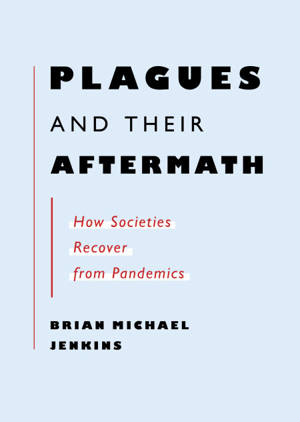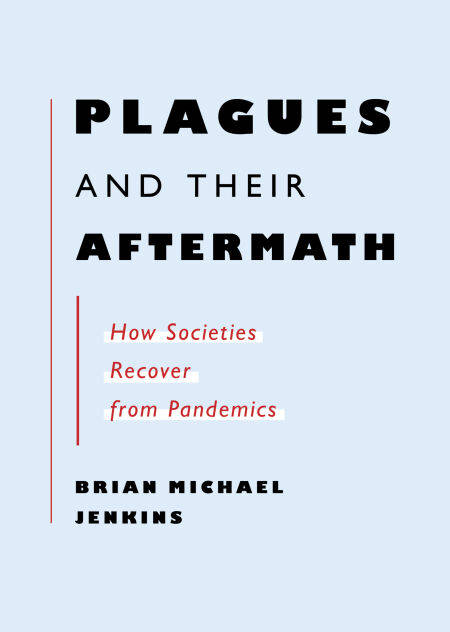
- Retrait gratuit dans votre magasin Club
- 7.000.000 titres dans notre catalogue
- Payer en toute sécurité
- Toujours un magasin près de chez vous
- Retrait gratuit dans votre magasin Club
- 7.000.0000 titres dans notre catalogue
- Payer en toute sécurité
- Toujours un magasin près de chez vous
Plagues and Their Aftermath EBOOK
How Societies Recover from Pandemics
Brian Michael Jenkins
Ebook | Anglais
16,75 €
+ 16 points
Format
Description
"Jenkins has organized his book around themes, and as he explores them, he leads the reader back and forth through history, pointing out parallels in humankind’s responses to different epidemics...thoroughly researched and cogently written..." -- New York Journal of Books
A look at the long history of epidemics and pandemics provides an enthralling account of what we can expect of a post-COVID world
In a concise, authoritative, and gripping telling, Brian Michael Jenkins — one of our leading authorities on national security and an advisor to governments, presidents and CEOs — provides a masterly account of what kind of future the planet might be facing ... by looking at the world's long history of epidemics and discerning what was common about their aftermath.
From a plague in Athens during the Peloponnesian War in 430 BCE, to another in 540 that wiped out half the population of the Roman empire, down through the Black Death in the Middle Ages and on through the 1918 flu epidemic (which killed between 50 and 100 million people) and this century's deadly SARS outbreak, plagues have been a much more relentless fact of life than many realize.
The legacy of epidemics, Jenkins observes, is not only one of lives lost but of devastated economies and social disorder, all of which have severe political repercussions.
Thus, each chapter of Plagues and Their Aftermath draws on those historical precursors to focus on one particular aspect of their aftermath: What happens to political systems? What happens in the area of crime and terrorism? Do wars happen? What are the effects on cultures? What was the impact of widespread fear and public hysteria, of increased suspicion and scapegoating, of the spread of rumors and conspiracy theories?
Jenkins' sobering analysis is riveting and thought-provoking reading for general readers and specialists alike, and throws welcome light into what many fear is a dark future.
A look at the long history of epidemics and pandemics provides an enthralling account of what we can expect of a post-COVID world
In a concise, authoritative, and gripping telling, Brian Michael Jenkins — one of our leading authorities on national security and an advisor to governments, presidents and CEOs — provides a masterly account of what kind of future the planet might be facing ... by looking at the world's long history of epidemics and discerning what was common about their aftermath.
From a plague in Athens during the Peloponnesian War in 430 BCE, to another in 540 that wiped out half the population of the Roman empire, down through the Black Death in the Middle Ages and on through the 1918 flu epidemic (which killed between 50 and 100 million people) and this century's deadly SARS outbreak, plagues have been a much more relentless fact of life than many realize.
The legacy of epidemics, Jenkins observes, is not only one of lives lost but of devastated economies and social disorder, all of which have severe political repercussions.
Thus, each chapter of Plagues and Their Aftermath draws on those historical precursors to focus on one particular aspect of their aftermath: What happens to political systems? What happens in the area of crime and terrorism? Do wars happen? What are the effects on cultures? What was the impact of widespread fear and public hysteria, of increased suspicion and scapegoating, of the spread of rumors and conspiracy theories?
Jenkins' sobering analysis is riveting and thought-provoking reading for general readers and specialists alike, and throws welcome light into what many fear is a dark future.
Spécifications
Parties prenantes
- Auteur(s) :
- Editeur:
Contenu
- Nombre de pages :
- 224
- Langue:
- Anglais
Caractéristiques
- EAN:
- 9781685890179
- Date de parution :
- 19-09-22
- Format:
- Ebook
- Protection digitale:
- Adobe DRM
- Format numérique:
- ePub

Les avis
Nous publions uniquement les avis qui respectent les conditions requises. Consultez nos conditions pour les avis.






